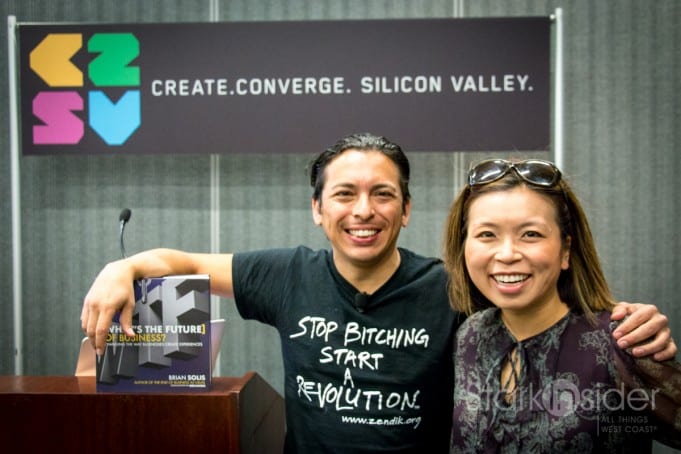WTF is BS talking about?
“I’m going to blow your mind.”
Mention social media, and chances are the name Brian Solis will come up faster than you can say end of business as usual.
Stumping for his new book (or, as he calls it, “an analog app”), What’s the Future of Business, Solis, the widely quoted social guru and “digital anthropologist” took us on a whirlwind, engaging presentation. I was once again learning about the Kings and Crazies of Silicon Valley as part of the C2SV tech conf and music fest in downtown San Jose.
This was my first time seeing Brian tell his story (watch short video highlights below). In terms of quotable sound bites, he takes the cake–he simply can’t be beat when it comes to Tweetable takeaways. His message is wrapped very much in the types of new communication vehicles he advocates businesses try to understand: memes, emotional messages, personal stories. It’s all about sharing experiences. Oh, and at least a few cat photos (“because they’re so cute”). I’d agree that is, as he notes, the best of “short attention span theater.”
“I want to help you think about the way the marketing is going–part technology, but more derivative of behavior..”
In the last 10 years companies so many brand name companies have died–Kodak, Borders, Blockbuster, RIM/BlackBerry–because they did not adapt. “We’re the last generation to know the ‘Kodak Moment’,” says Solis. “Now, we need to avoid it. That’s now the moment you fail.”
Case in point: Blockbuster. The movie rental retailer refused to see the world in a new way. People would always want to head to a local store, rent a movie, and buy some popcorn. Right? Blockbuster would famously refuse to believe streaming video would ever take-off, even passing on the opportunity to buy Netflix.
“We need to adopt to a culture of Leadership, not Management.”
Central to the new thinking is the notion of “Creative Destruction.” Based on an old economic principle at its core the idea is that we take everything as we know it today and “f—” it up. “Innovate or die.” Why? Because everything needs to be re-invented. Indeed, that very thinking is the genesis of many of today’s most successful start-ups in Silicon Valley.
Today’s dichotomy is that we’re making decisions about the future of economies, governments, laws based upon the way we knew the world as it was. For example, he notes, managers often complain about Millennials (tell me about it!) – they’ve received too many trophies growing up!
But we need to embrace a new perspective.
So, then, what are conversations today all about?
For this man’s 1 year old daughter, a magazine is “an iPad app that does not work.”
Solis explains, “They are a compilation of shared experiences. We share experiences. We react to experiences.”
“Therefore we must create experiences that others share.”
He suggests that companies must design into products and services how people react, something that inspires.
Look at any airline. There’s a disconnect between the conversation and the brand promise. “Aside from JetBlue, Southwest, and Virgin, you’ll see a lot of expletives on social media.” Yet on the airlines’ web sites you see something completely different; promises of loyalty, service. So, there’s an experience divide. But with JetBlue, Southwest, and Virgin, it’s the exact opposite. People love these brands to no end.
MORE #C2SV KINGS & CRAZIES COVERAGE on Stark Insider
Today’s disruptors who get it
Twitter, Instagram, Uber, Square, Spotify, are some of the examples cited of companies who understand the new world of disruption. Twitter might be the most interesting example, he says. Before Twitter we had social networks, but we didn’t have a main cultural pulse that we could plug into and out of in real-time.
But to be clear: innovation is not necessarily about technology.
Innovation starts with empathy. Or vision. Or a dilemma. Or some emotion that changes how you see the world.
To that I say: spot on. Mind blown? Maybe. More like, mind overloaded and re-wired.


